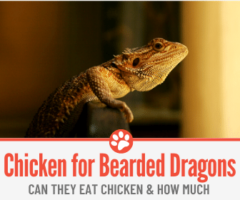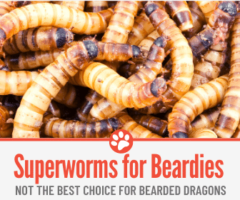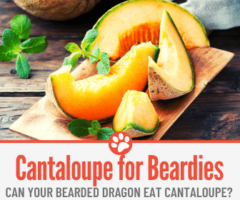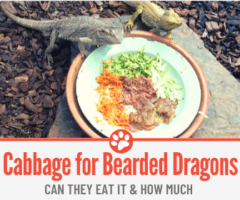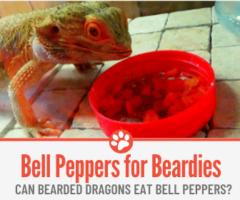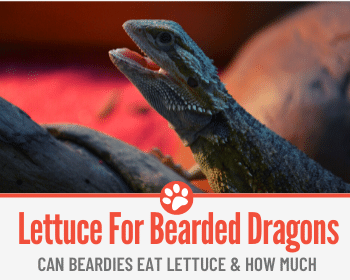 Wondering if you can feed Lettuce to your Bearded Dragon? If So which kind is the best?
Wondering if you can feed Lettuce to your Bearded Dragon? If So which kind is the best?
In this guide you will learn:
- If Beardies can eat Lettuce
- Dangers of Feeding too much Lettuce
- Comparison Between Romaine, Red Leaf & Butter Lettuce
- Can Baby Bearded Dragons eat Lettuce
Can Bearded Dragons Eat Lettuce?
Bearded dragons technically can eat Lettuce, but it is advised not to feed it to them, at least not in large quantities. Lettuce has little nutritional value and is mainly made up of water. Bearded dragons should be on a diet that provides them with all sorts of different nutritional benefits, and lettuce simply does not fit into this category.
Although lettuce should not be given to a bearded dragon as a part of a hearty and balanced diet, other types of greens are actually encouraged! This does not mean, though, that the majority of greens should be given to your pet, even if the greens are known to be beneficial to humans.
A bearded dragon’s diet is pretty restrictive, and there are many things that are poisonous to them, even if they are considered extremely healthy when it comes to humans.
That being said, it is very important that you keep a close eye on what you are handing and feeding to your bearded dragon because you may end up with a sick beardie and a variety of different health issues.
Why You Should Choose Other Greens Over Lettuce
Lettuce is not a toxic or poisonous food for a bearded dragon. There are various debates, though, whether or not lettuce should be given to a dragon in small amounts or not at all.
The majority of professionals, experts, and reptile enthusiasts seem to agree, at least, upon two things: Firstly, lettuce can be given to and eaten by your pet in small amounts without any serious and negative secondary symptoms.
Secondly, there exist other greens and vegetables that are much more nutritious for your dragon to ingest rather than lettuce.
No matter which way you look at it, lettuce does not give any type of crucial nutrients to your dragon since it is mostly made up of water and little else. The same can be said of, for example, celery and cucumbers.
And if you give your dragon sufficient amounts of water in a bowl that is available to it at all times, then lettuce will not be a necessary part of your bearded dragon’s hydration needs.
In fact, some may even argue that lettuce may cause a dragon diarrhea because of it being so completely saturated with water. Whereas a dragon can tell how much water it needs to drink to feel sufficiently hydrated, doing so with lettuce is impossible.
To avoid the possible case of diarrhea and to maintain a balanced, healthy, and nutritious diet for your bearded dragon, it would be wiser to focus on feeding it other greens, some which are closely related to lettuce and others that are distant cousins.
For example, endives, mustard greens, and swiss chard are all safe for your pet to eat and contain significant amounts of vitamins and minerals, especially when compared to lettuce.
When feeding swiss chard to your dragon, though, make sure you do not mistake it for rhubarb which happens to be highly toxic to all bearded dragons. If concerned that you grabbed the wrong vegetable and given it to your beardie, contact your local veterinarian as soon as possible.
If you are not willing to risk the possibility of mistaking rhubarb for swiss chard, then green cabbage is another vegetable that bearded dragons can eat safely, as long as it has been washed and remains raw. Kale, bok choy, and collard greens are three other types of leafy greens that are widely available and safe for your bearded dragon to eat as a part of its overall diet. T
wo other key things to remember about all of these greens is that they should always be washed and kept in their raw form when served to your bearded dragon. Sharing your cooked vegetables or ones already covered in oils and vinaigrettes would cause sickness and end up with an emergency vet visit.
Two other dark leafy greens that seem like they would be great additions to a bearded dragon’s diet are spinach and beet tops. While widely known as healthy and nutritious for humans, these two greens can cause serious problems for bearded dragons.
Although some say that they may be given from time to time in tiny portions, it is generally safer to completely keep them out of a dragon’s diet. This is because these vegetables contain a chemical that inhibits calcium absorption which then may very well lead to bone disease if enough of the chemical enters the dragon’s body.
Your best bet is sticking to vegetables that will not have any potential side effects when eaten by your pet.
In any case, the final decision of whether your dragon will be eating the occasional lettuce here and there is up to you. No one can stop you from doing so nor can anyone force you into doing so.
Your veterinarian or reptile expert will most likely not encourage you to feed it to your lizard, but he probably will not put it on the banned list, either. As the caring and loving owner of a bearded dragon, you are the one who is in charge of your dragon’s health.
What you choose to do is entirely up to you.
Can Bearded Dragons Eat Butter Lettuce, Romain Lettuce, Or Red Leaf Lettuce?
Yes, they can eat all three of these lettuces, and your bearded dragon will not be poisoned if you feed them to it. Does that mean you need to be feeding these lettuces to your bearded dragon, though?
Not at all. Lettuce does not serve any particular or important function in your dragon’s diet and provides not nutritional value. If your pet likes a certain type of lettuce, you might give a little bit to your dragon to munch on and enjoy here and there, but in no way is lettuce a necessary part of a bearded dragon’s diet.
Can Baby Bearded Dragons Eat Lettuce?
In the case of baby bearded dragons, you should completely avoid giving them any and all types of lettuce. They simply do not need it. Moreover, baby dragons happen to require a different type of diet than that of an adult bearded dragon. In fact, a baby bearded dragon’s diet should be more focused on animal-based proteins than that of an adult’s.
This is definitely not to say that baby dragons do not need their vegetables and fruits. More often than not, baby dragons will need to take extra supplements to hit their required levels of various types of vitamins and minerals instead of getting them directly from fruits and vegetables the way that adult dragons do.
Baby bearded dragons grow, so their dietary needs are different from those of a full grown adult.
It is actually extremely important that you speak to your veterinarian, or your local reptile expert, to make sure that you are well-prepared and well-versed in what foods, and how much of these foods, you should be giving to your baby dragon.
Human babies eat differently compared to human adults, and it’s a parallel that can be drawn between baby dragons and adult dragons as well! Being informed and up to date on your dragon’s dietary needs is key in keeping your pet healthy and safe.
What Lettuce is Safe For Bearded Dragons
Generally, all lettuce is safe for bearded dragons. Whether that be romaine, butter, iceberg, red leaf, or French crisp lettuce, they are all deemed safe and can be eaten without any serious side effects.
That being said, giving a large quantity or amount of lettuce to your dragon in a day or over a period of time is not recommended as this will most likely cause an unwanted case of diarrhea.
Seeing as lettuce is mostly water and lacks any other type of nutritional value, it is advised to limit portions of lettuce that you feed to your dragon if you do end up deciding on including lettuce in your dragon’s diet.
Diverse and Varying Professional Opinions on Lettuce
Every person you meet, whether they be a professional reptile expert or a reptile enthusiast, will have varying opinions on the topic of feeding lettuce to bearded dragons. Some may state that romaine lettuce is healthier than butter lettuce or that dragons prefer red leaf lettuce over iceberg lettuce.
Others may declare that you can give only certain types of lettuce to your beardie while others are not recommended. The one certain fact regarding lettuce with regards to bearded dragons and their diet is that lettuce is almost completely made of water and will provide absolutely no nutritional value to your dragon.
What lettuce may cause, if given in larger amounts, is loose stools and diarrhea due to its high water content. While professional opinion is usually correct and should be followed, the subject of lettuce concerning bearded dragons tends to be a slightly controversial one.
Related Questions
Which foods should you absolutely avoid giving to a bearded dragon?
There are several foods that, although perfectly safe and super healthy for humans to eat, happen to be extremely toxic and poisonous for bearded dragons. It is important to be aware of what these fruits, vegetables, and animals are in order to avoid health complications, illness, and even death.
One of these poisonous foods that must be kept far away from a bearded dragon and never included in its diet is avocado. A large amount will kill your reptile, but even in small doses your dragon will become seriously ill. Another fruit that is just as toxic as avocado is rhubarb. If you make the mistake of feeding either fruit to your pet, immediately reach out to your veterinarian for help.
Several other foods that should be avoided are citric fruit, seafood and fish, and mushrooms.
The high level of acidity in citric fruit will hurt your dragon’s stomach, seafood and fish are not a part of a dragon’s normal dietary requirements nor are they food that a bearded dragon would eat in the wild, and all mushrooms are toxic to these reptiles. Avoid these three categories of foods at all costs.
Make sure to also stay away from any glowing insects, such as fireflies. Glowing insects are highly toxic to bearded dragons and will kill your pet if ingested. A general rule of thumb is to not give your pet any wild animals unless you have bought them directly from a reptile store.
All glowing insects will cause death, whereas other wild animals and insects found outdoors may contain bacteria or disease that could make your bearded dragon severely ill. In kind, when bringing your reptile out of the house, make sure he does not eat anything from the outside.
Keep your dragon healthy by feeding it the right things, and remember to always keep a constant eye out for what your beardie is up to when you take it out of its cage.
Can a bearded dragon have preferences in regards to what it eats?
This may be surprising, but, yes, a bearded dragon will most likely have a taste for certain vegetables, fruits, and animals, just like you and I! It may also dislike certain foods or outright refuse to eat them.
Dragons have food preferences, in the same way that humans do, so you may even end up with a dragon that is a picky eater or one that is all too happy to eat anything you give it.
Whatever its food preferences may be, remember that your beardie should be eating a balanced diet to stay healthy and in shape. After all, even bearded dragons can become obese!

